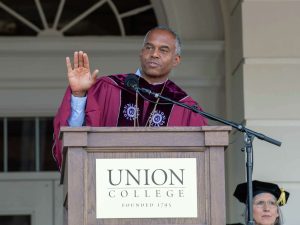Juan Guaidó declared as Venezuela’s Interim President
February 2, 2019
Venezuela’s opposition, backed by the U.S., Canada and many Latin American nations has declared Mr. Maduro illegitimate and recognized the head of the National Assembly, Juan Guaidó, as an interim president until new elections are called. Mr. Maduro has responded that he isn’t going anywhere and has been backed by the armed forces.
“Here, we protect people,” Mr. Guaidó said. “Every official who wants to be on the side of the constitution, every official who wants to have order and end the usurpation… will be welcomed.” His speech was delivered two days after the U.S. backed him.
Thousands of supporters gathered at the Bolívar Plaza, Chacao and greeted Mr. Guaidó, the leader of the National Assembly with chants of “Presidente!” and “Yes, we can!”
Mr. Maduro gave a speech from the presidential palace and it was broadcasted on open-air.
“We are going to defeat this coup,” said Mr. Maduro, “We should be increasingly prepared for any military threat.
If you want peace, if you love your homeland, prepare to defend it”. Mr. Maduro thanked Russia, China and Turkey for countering the U.S. by supporting him.
Venezuela’s political crisis is threatening the nation’s oil industry which would increase the economic implications.
During President Nicolás Maduro’s first six-year term, the economy has contracted by nearly half.
Inflation is estimated at more than a million percent. Widespread shortages of food and medicine have affected three million Venezuelans to emigrate.
Political turmoil that affects Venezuela’s oil exports, which provide 95% of the country’s hard currency income, could double the size of this year’s economic contraction to a 30% decline in economic output from an estimated 15% decline.
U.S. officials say they want to divert oil money, as well as control over other assets like gold reserves away from Mr. Maduro to the new interim president.
“Diplomatic and economic relations between the United States and Venezuela must be consistent with the United States’ recognition of Juan Guaidó and the National Assembly,” the U.S. Treasury Department said in a statement on Friday.
“The United States will use its economic and diplomatic tools to ensure that commercial transactions by the Venezuelan Government, including those involving its state-owned enterprises and international reserves, are consistent with this recognition.”
Although oil exports decreased in the past years, they remain crucial to global oil markets and American refiners, which depend on Venezuelan crude oil to make fuel.
Venezuela still exports about 500,000 barrels of crude oil to the U.S. every day.
However, much of the rest of its oil output goes to China and other markets as repayment of loans, the oil it sends to the U.S. represents the only real cash that the country gets nowadays, economists say.
Cutting off Mr. Maduro’s oil money could have dramatic effects. In fact, Francisco Rodríguez, head of Torino Capital, estimates Venezuelan oil production to fall another 40% this year.
U.S. based oil-field service providers like Schlumberger still operate in Venezuela, and the country relies on imports of parts and fuels from the U.S. to keep its industry going.






